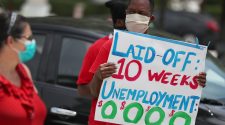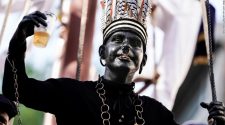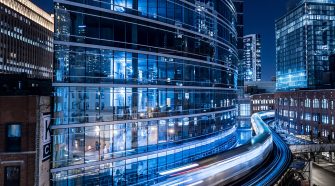Clashes have erupted again between police and protesters in Hong Kong after a demonstration against a controversial extradition bill, this time in Sha Tin, a bustling town between Hong Kong island and the border with China.
During the police-sanctioned demonstration tens of thousands of people marched peacefully against the bill which would allow for individuals to be sent to China for trials in its Communist party-controlled courts.
Shortly after 5pm local time on Sunday clashes broke out between police and protesters at a location outside the approved route and police fired pepper spray on protesters.
Some protesters placed traffic cones on the street, dismantled roadside metal barriers and set up makeshift barricades to separate themselves from police, who formed into a line. Protesters then became locked in a standoff with police officers in riot gear. Those standing near the police line put on goggles, face masks and helmets and armed themselves with umbrellas in case police used pepper spray.
Why are people protesting?
What started in early June as protests against a new extradition law have broadened into a pro-democracy movement concerned about the wider relationship between Hong Kong and China and the future for the special administrative region.
Hong Kong’s chief executive, Carrie Lam, has offered a ‘solemn’ personal apology for the crisis and also hinted that she had in effect shelved the controversial legislation. However, protesters criticised her as insincere and said she had ignored their key demands. The demonstrations have continued.
What was the proposed extradition law?
People have been demonstrating against legal changes that would make it easier to extradite people from Hong Kong to China. Supporters say the amendments are key to ensuring the city does not become a criminal refuge, but critics worry Beijing will use the law to extradite political opponents and others to China. Under the amended law, those accused of offences punishable by seven years or more in prison could be extradited.
Who is supporting the change?
The government claims the push to change the law, which would also apply to Taiwan and Macau, stems from the killing last year of a Hong Kong woman while she was in Taiwan with her boyfriend. Authorities in Taiwan suspect the woman’s boyfriend, who remains in Hong Kong, but cannot try him because no extradition agreement is in place.
Officials have promised to safeguard against abuses, pledging that no one at risk of political or religious persecution will be sent to the mainland. Suspects who could face the death penalty would not be extradited.
Hong Kong officials have repeatedly said the bill has not come from the central government in Beijing. However, Beijing has voiced its backing for the changes.
Why are Hong Kongers so angry?
Many fear the proposed extradition law will be used by authorities to target political enemies. They worry the new legislation spells the end of the ‘one country, two systems’ policy, eroding the civil rights enjoyed by Hong Kong residents since the handover of sovereignty from the UK to China in 1997.
Many attending the protests said they could not trust China as it had often used non-political crimes to target government critics, and they also feared Hong Kong officials would not be able to reject Beijing’s requests. Legal professionals have also expressed concern over the rights of those sent across the border to be tried. The conviction rate in Chinese courts is as high as 99%. Arbitrary detentions, torture and denial of legal representation of one’s choosing are also common.
How have authorities responded?
After the current crisis, analysts believe the Hong Kong government will probably start a new round of retaliatory measures against its critics while the Chinese government will tighten its grip on the city. Police have said that 32 people have been arrested over the recent demonstrations and five have been charged with rioting, which carries a maximum sentence of 10 years’ imprisonment. Six pro-democracy members of the legislature have already been ousted.
Lily Kuo in Beijing and Verna Yu in Hong Kong
Noisy protesters chanted: “Nasty police, shame on you!” and shouted “Hong Kong, go!” to boost their spirit.
At about 6.30pm, more than a hundred riot police in green uniform emerged on the scene holding long shields. Angry protesters shouted: “Warrant cards! Warrant cards!”, complaining that police did not have identification numbers on their uniforms.
On Saturday police had used pepper spray and batons to clear protesters in a similar protest in Sheung Shui, on the Chinese border, after clashes with protesters who refused to leave after a police-sanctioned march.
Police announced on Sunday that two men had been arrested in the Sheung Shui protest and they “strongly condemn the deliberate attacks by violent protesters”. They accused the protesters of blocking roads, assaulting police officers, throwing iron rods and scattering unidentified powder, and said they would “investigate and resolutely pursue all illegal and violent acts”.
The extradition bill has been suspended and Hong Kong’s chief executive, Carrie Lam, has declared it “dead”, but this has failed to reassure ordinary citizens who fear it could be revived. At the demonstration in Sha Tin protesters also urged the authorities to release people who have been detained during protests over the past month, and to investigate police use of force.
“Release the righteous fighters! Carrie Lam step down! Shame on the nasty police!” they chanted.
Since 9 June Hong Kong has been rocked by its biggest political crisis, with millions thronging the streets under the sweltering sun to protest against the proposed extradition law, which many fear could result in government critics being sent to China to stand trial.
The anti-extradition movement has morphed into a bigger movement encompassing a range of different complaints over the past weeks. Many Hong Kong citizens say they have felt energised and emboldened by the solidarity and big turnout at recent protests, which have made headlines across the world.
The extradition protests have also reignited a longing for democracy. On Sunday, many protesters also chanted: “I want genuine universal suffrage!”
Hong Kong’s leader is not elected by ordinary voters but by an elite committee accountable to Beijing. Only half of the 70-seat legislature is directly elected, while the other 35 seats are occupied by mostly pro-establishment figures from corporate and special interest groups.
The Hong Kong government has ejected pro-democracy lawmakers and barred candidates seen as pro-independent from running for elections, thereby stripping the pro-democracy camp’s ability to block unpopular policies in the legislature.
















